表推测的情态动词
表示推测的情态动词的用法归纳
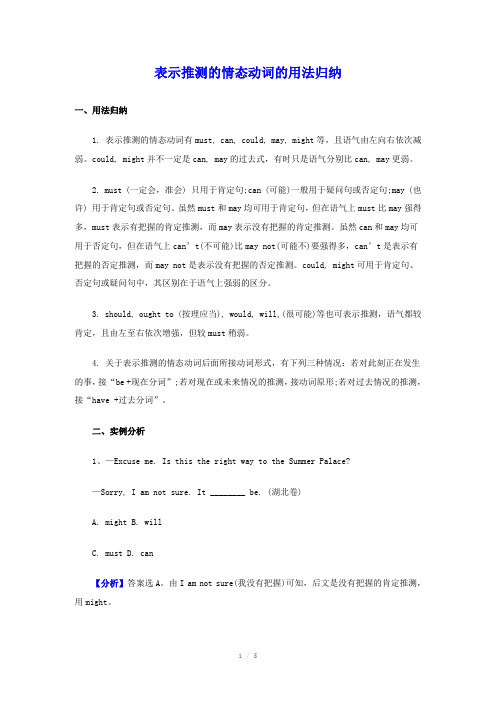
表示推测的情态动词的用法归纳一、用法归纳1. 表示推测的情态动词有must, can, could, may, might等,且语气由左向右依次减弱。
could, might并不一定是can, may的过去式,有时只是语气分别比can, may更弱。
2. must (一定会,准会) 只用于肯定句;can (可能)一般用于疑问句或否定句;may (也许) 用于肯定句或否定句。
虽然must和may均可用于肯定句,但在语气上must比may强得多,must表示有把握的肯定推测,而may表示没有把握的肯定推测。
虽然can和may均可用于否定句,但在语气上can’t(不可能)比may not(可能不)要强得多,can’t是表示有把握的否定推测,而may not是表示没有把握的否定推测。
could, might可用于肯定句、否定句或疑问句中,其区别在于语气上强弱的区分。
3. should, ought to (按理应当), would, will,(很可能)等也可表示推测,语气都较肯定,且由左至右依次增强,但较must稍弱。
4. 关于表示推测的情态动词后面所接动词形式,有下列三种情况:若对此刻正在发生的事,接“be +现在分词”;若对现在或未来情况的推测,接动词原形;若对过去情况的推测,接“have +过去分词”。
二、实例分析1、—Excuse me. Is this the right way to the Summer Palace?—Sorry, I am not sure. It ________ be. (湖北卷)A. mightB. willC. mustD. can【分析】答案选A。
由I am not sure(我没有把握)可知,后文是没有把握的肯定推测,用might。
2、You might just as well tell the manufacturer that male customers ________ not like the design of the furniture. (上海卷)A. mustB. shallC. mayD. need【分析】答案选C。
情态动词表推测

情态动词can, could, may, might, must表推测的用法:情态动词中的can, could, may, might, must都表推测。
其中must的可能性最大,can / could 次之,may / might最小。
具体用法如下:1. must的用法(1)表示推测“可能性”时,意思是“一定、准是”,语气较肯定,较有把握。
He must be American. = It is certain that he is American. 他准是个美国人。
(2)must表推测只能用于肯定句。
如表示“一定不、肯定不”的意思时,应用can`t,如询问某种可能时,应用can。
He must know my address. 他肯定知道我的地址。
(一定)He can`t know my address. 他肯定不知道我的地址。
(一定不)Can he know my address? 他知道我的地址吗?(询问可能性)(3)must表示推测时,可以推测现在/正在发生的动作/过去发生的动作。
He must have a car now. (现在)他一定有辆小汽车。
He must be doing his exercises in the classroom.(正在进行)他一定在教室里做练习。
He must have finished the work.(过去发生)他一定已完成了工作。
注:must表示推测时很少用于将来的情况。
一般不用He must come tomorrow.可用It`s certain / I`m sure that he will come tomorrow.(4)在反意疑问句中,当附属部分含有表示推测意义的must时,疑问部分的助动词应与must后面的动词在非推测情况下的用法保持一致。
He must be a worker, isn`t he? (现在)他准时个工人,是吗?Y ou must have learned English for many years, haven`t you? (完成时)你一定学了好多年英语,是吗?比较:It must have rained last night, didn`t it? (过去)昨晚一定下雨了,是不是?He must have arrived by yesterday morning, ha dn‟t he?2. can / could的用法(1)can表示推测“可能性”时,往往用于否定句或疑问句。
初三情态动词表推测

Amy
教学任务:
1.表推测的情态动词 2.表肯定推测的用法 3.表否定推测的用法 4.表不确定性推测的用法 5.情态动词表推测习题
Translate:
He must know the answer. 他一定知道答案。 He can’t know the answer. 他肯定不知道答案
1.表肯定推测: must+V原(一定) 2. 表否定推测: can't+V原(不肯能) 3.表不确定性推测: may+V原(可能) maight,could+V原(可能) may not+V原(可能不)
Exercises
Choose the correct answer.
1.— Excuse me.Is this the right way to the
1. 表推测的情态动词有:
must>may> might,could >may not >can't
must
could might
can’t
must
100% probably true
could might
20%~80% possibly true
0
can’t almost not true
表推测:
A must B.mustn't C can D.can't 8.(河南中考)—What's the matter with Tom?He has been absent for two days. —Oh! He ____ be ill.Let's go and ask Ms.Brown. A can B need C may D would
情态动词表推测
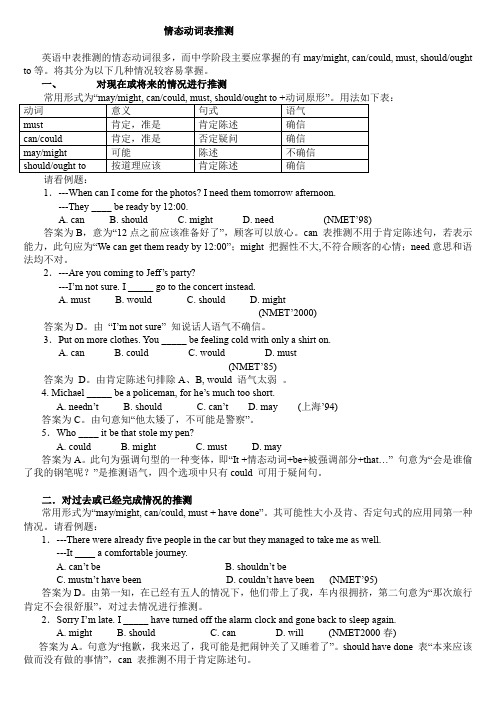
情态动词表推测英语中表推测的情态动词很多,而中学阶段主要应掌握的有may/might, can/could, must, should/ought to等。
将其分为以下几种情况较容易掌握。
一、对现在或将来的情况进行推测1.---When can I come for the photos? I need them tomorrow afternoon.---They ____ be ready by 12:00.A. canB. shouldC. mightD. need (NMET’98)答案为B,意为“12点之前应该准备好了”,顾客可以放心。
can 表推测不用于肯定陈述句,若表示能力,此句应为“We can get them ready by 12:00”;might 把握性不大,不符合顾客的心情;need意思和语法均不对。
2.---Are you coming to Jeff’s party?---I’m not sure. I _____ go to the concert instead.A. mustB. wouldC. shouldD. might(NMET’2000)答案为D。
由“I’m not sure” 知说话人语气不确信。
3.Put on more clothes. You _____ be feeling cold with only a shirt on.A. canB. couldC. wouldD. must(NMET’85)答案为D。
由肯定陈述句排除A、B, would 语气太弱。
4. Michael _____ be a policeman, for he’s much too short.A. needn’tB. shouldC. can’tD. may (上海’94)答案为C。
由句意知“他太矮了,不可能是警察”。
5.Who ____ it be that stole my pen?A. couldB. mightC. mustD. may答案为A。
表推测的情态动词

二.“情态动词+have done” 的用法。 1.must have done “过去一定做了某事” 表示对过去的一种肯定性推测。 eg. She must have gone by bus. It must have rained last night, for the road is quite muddy.
表示推测的情态动词
一. 表推测的情态动词有: 肯定的推测一般用must,should/ought to, may/might或could(不用can) 1.must的语气最强,译为“肯定, 准 是,想必是”;(mustn’t 表示禁止) 2.should/ought to 的语气次之,译为 “很可能, 应该”,指按常理推测; 3.may/might,could的语气最弱,译为 “也许,可能”。 4.can’t /couldn’t 表示否定推测, ‘‘不可
eg. You have been working hard all
Hale Waihona Puke day ,you must be tired. He must be working in the office now. He should come here today. Can this be done by him? She may be still waiting for us. This may not be done by him. This can not be done by him.
2. can/could have+done“过去可能 做了某事”, “could have+done”也可表示‘‘过 去本可以做某事但实际上却没有做” eg. He was not at home last night, he could have gone to the cinema. I could have finished my homework last night, but I was too sleepy.
表推测的情态动词及其用法
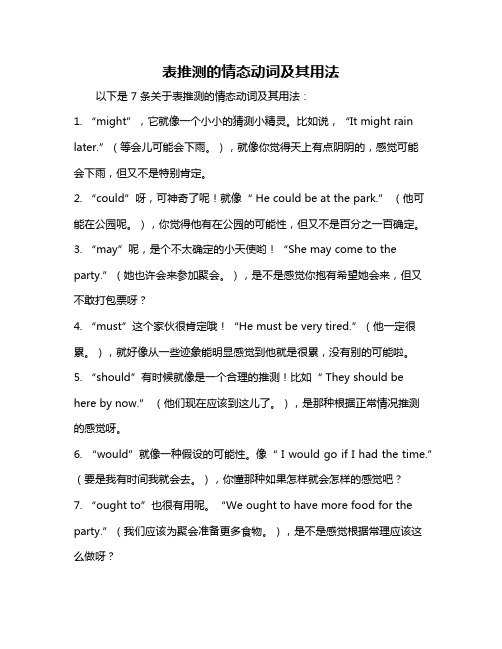
表推测的情态动词及其用法以下是 7 条关于表推测的情态动词及其用法:1. “might”,它就像一个小小的猜测小精灵。
比如说,“It might rain later.”(等会儿可能会下雨。
),就像你觉得天上有点阴阴的,感觉可能会下雨,但又不是特别肯定。
2. “could”呀,可神奇了呢!就像“ He could be at the park.” (他可能在公园呢。
),你觉得他有在公园的可能性,但又不是百分之一百确定。
3. “may”呢,是个不太确定的小天使哟!“She may come to the party.”(她也许会来参加聚会。
),是不是感觉你抱有希望她会来,但又不敢打包票呀?4. “must”这个家伙很肯定哦!“He must be very tired.”(他一定很累。
),就好像从一些迹象能明显感觉到他就是很累,没有别的可能啦。
5. “should”有时候就像是一个合理的推测!比如“ They should behere by now.” (他们现在应该到这儿了。
),是那种根据正常情况推测的感觉呀。
6. “would”就像一种假设的可能性。
像“ I would go if I had the time.” (要是我有时间我就会去。
),你懂那种如果怎样就会怎样的感觉吧?7. “ought to”也很有用呢。
“We ought to have more food for the party.”(我们应该为聚会准备更多食物。
),是不是感觉根据常理应该这么做呀?我觉得啊,这些情态动词让我们的表达更丰富、更灵活,能更好地传达我们心中那种不确定或者推测的感觉,真是太奇妙啦!。
初三情态动词表推测
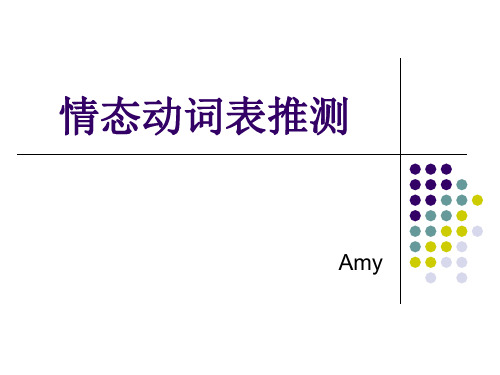
Choose the correct answer.
3. You ____ be tired — you’ve only been working for an hour. A. must not B. won’t C. can’t D. may not 4. — Is John coming by train? — He should, but he _____ not. He likes driving his car. A. must B. can C. need D. may
Exercises
5. —Mum, Ive signed for the box. What's in it? —I'm not sure. It _____be a present from your uncle. A need B must C may D will 6. This pair of glasses _____be Tony's. He is the only one who wears glasses. A must B might Ccan't
Summary:
表推测:
1.表肯定推测: must+V原(一定) 2. 表否定推测: can't+V原(不肯能) 3.表不确定性推测: may+V原(可能) maight,could+V原(可能) may not+V原(可能不)
Homework
Homework 课后作业 (1)记会情态动词表推测用法。 (2)写unit8练习册语法部分习题。
表推测:
1.表肯定推测: must+V原(一定) 2. 表否定推测: can't+V原(不肯能) 3.表不确定性推测: may+V原(可能) maight,could+V原(可能) may not+V原(可能不)
【英语知识点】表推测的情态动词用法
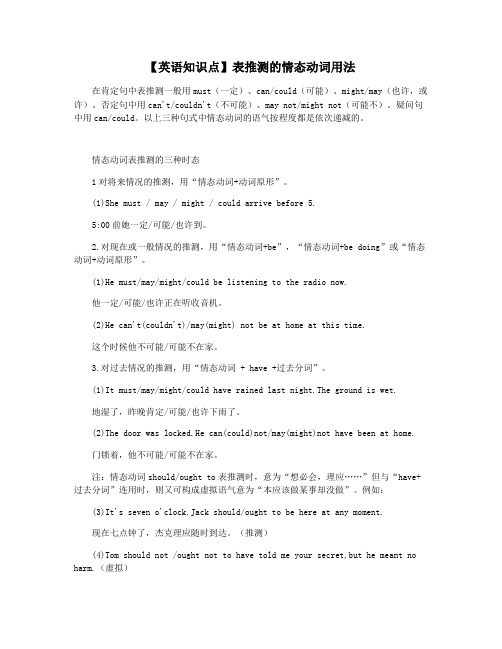
【英语知识点】表推测的情态动词用法在肯定句中表推测一般用must(一定)、can/could(可能)、might/may(也许,或许)。
否定句中用can't/couldn't(不可能)、may not/might not(可能不)。
疑问句中用can/could。
以上三种句式中情态动词的语气按程度都是依次递减的。
情态动词表推测的三种时态1对将来情况的推测,用“情态动词+动词原形”。
(1)She must / may / might / could arrive before 5.5:00前她一定/可能/也许到。
2.对现在或一般情况的推测,用“情态动词+be”,“情态动词+be doing”或“情态动词+动词原形”。
(1)He must/may/might/could be listening to the radio now.他一定/可能/也许正在听收音机。
(2)He can't(couldn't)/may(might) not be at home at this time.这个时候他不可能/可能不在家。
3.对过去情况的推测,用“情态动词 + have +过去分词”。
(1)It must/may/might/could have rained last night.The ground is wet.地湿了,昨晚肯定/可能/也许下雨了。
(2)The door was locked.He can(could)not/may(might)not have been at home.门锁着,他不可能/可能不在家。
注:情态动词should/ought to表推测时,意为“想必会,理应……”但与“have+过去分词”连用时,则又可构成虚拟语气意为“本应该做某事却没做”。
例如:(3)It's seven o'clock.Jack should/ought to be here at any moment.现在七点钟了,杰克理应随时到达。
情态动词表推测
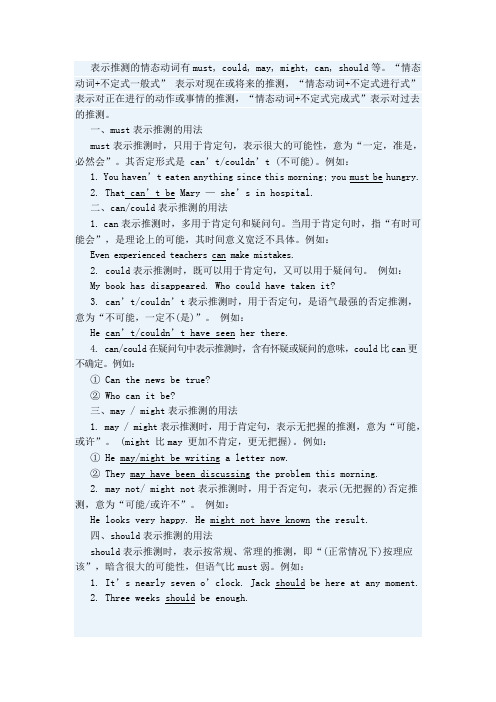
表示推测的情态动词有must, could, may, might, can, should等。
“情态动词+不定式一般式” 表示对现在或将来的推测,“情态动词+不定式进行式”表示对正在进行的动作或事情的推测,“情态动词+不定式完成式”表示对过去的推测。
一、must表示推测的用法must表示推测时,只用于肯定句,表示很大的可能性,意为“一定,准是,必然会”。
其否定形式是can’t/couldn’t (不可能)。
例如:1. You haven’t eaten anything since this m orning; you must be hungry.2. That can’t be Mary —she’s in hospital.二、can/could表示推测的用法1. can表示推测时,多用于肯定句和疑问句。
当用于肯定句时,指“有时可能会”,是理论上的可能,其时间意义宽泛不具体。
例如:Even experienced teachers can make mistakes.2. could表示推测时,既可以用于肯定句,又可以用于疑问句。
例如:My book has disappeared. Who could have taken it?3. can’t/couldn’t表示推测时,用于否定句,是语气最强的否定推测,意为“不可能,一定不(是)”。
例如:He can’t/couldn’t have seen her there.4. can/could在疑问句中表示推测时,含有怀疑或疑问的意味,could比can更不确定。
例如:① Can the news be true?② Who can it be?三、may / might表示推测的用法1. may / might表示推测时,用于肯定句,表示无把握的推测,意为“可能,或许”。
(might 比may 更加不肯定,更无把握)。
例如:① He may/might be writing a letter now.② They may have been discussing the problem this morning.2. may not/ might not表示推测时,用于否定句,表示(无把握的)否定推测,意为“可能/或许不”。
情态动词表推测的口诀

情态动词表推测的口诀在日常生活中,我们常常需要用英语进行推测,此时就需要借助情态动词。
情态动词在表示推测时,有较强的语气助词作用,能表达说话者对某件事情的猜测或推测。
下面我们将学习一些常用的推测性情态动词及其用法。
一、推测性情态动词的分类和含义1.肯定推测:can、could、may、might、must、should等。
2.否定推测:can"t、couldn"t、may not、might not、mustn"t、shouldn"t等。
二、情态动词表推测的口诀1.肯定推测:can、could、may、might、must、should口诀:肯定推测用yes,can、could、may、might、must、should解忧愁。
2.否定推测:can"t、couldn"t、may not、might not、mustn"t、shouldn"t口诀:否定推测别慌张,can"t、couldn"t、may not、might not、mustn"t、shouldn"t来帮忙。
三、实例分析与应用1.肯定推测例句:He can be the one who saved her.他可能是救她那个人。
You might know the answer.你可能知道答案。
2.否定推测例句:She can"t have done that.她不可能做过那件事。
He shouldn"t be late.他不应该迟到。
掌握这些推测性情态动词,并在实际交流中灵活运用,能帮助我们更准确地表达猜测和推测。
初中表推测的情态动词小结
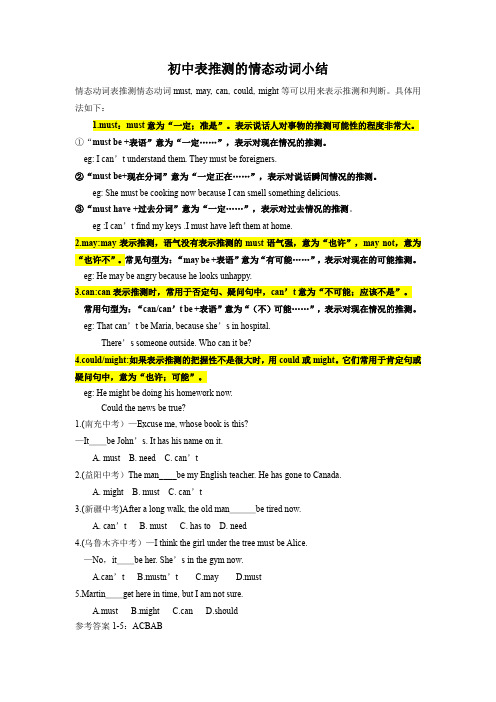
初中表推测的情态动词小结情态动词表推测情态动词must, may, can, could, might等可以用来表示推测和判断。
具体用法如下:1.must:must意为“一定;准是”。
表示说话人对事物的推测可能性的程度非常大。
①“must be +表语”意为“一定……”,表示对现在情况的推测。
eg: I can’t understand them. They must be foreigners.②“must be+现在分词”意为“一定正在……”,表示对说话瞬间情况的推测。
eg: She must be cooking now because I can smell something delicious.③“must have +过去分词”意为“一定……”,表示对过去情况的推测。
eg :I can’t find my keys .I must have left them at home.2.may:may表示推测,语气没有表示推测的must语气强,意为“也许”,may not,意为“也许不”。
常见句型为:“may be +表语”意为“有可能……”,表示对现在的可能推测。
eg: He may be angry because he looks unhappy.3.can:can表示推测时,常用于否定句、疑问句中,can’t意为“不可能;应该不是”。
常用句型为:“can/can’t be +表语”意为“(不)可能……”,表示对现在情况的推测。
eg: That can’t be Maria, because she’s in hospital.There’s someone outside. Who can it be?4.could/might:如果表示推测的把握性不是很大时,用could或might。
它们常用于肯定句或疑问句中,意为“也许;可能”。
eg: He might be doing his homework now.Could the news be true?1.(南充中考)—Excuse me, whose book is this?—It__be John’s. It has his name on it.A. mustB. needC. can’t2.(益阳中考)The man____be my English teacher. He has gone to Canada.A. mightB. mustC. can’t3.(新疆中考)After a long walk, the old man___be tired now.A. can’tB. mustC. has toD. need4.(乌鲁木齐中考)—I think the girl under the tree must be Alice.—No,it__be her. She’s in the gym now.A.can’tB.mustn’tC.mayD.must5.Martin__get here in time, but I am not sure.A.mustB.mightC.canD.should参考答案1-5:ACBAB。
情态动词表推测
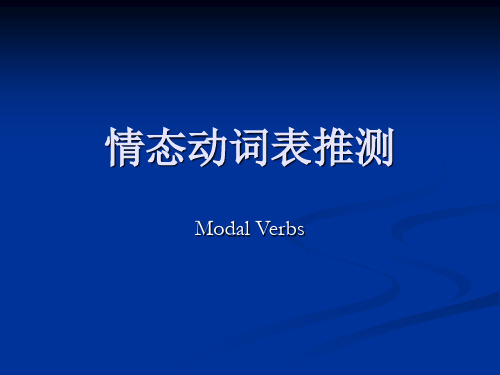
______ be at home. can’t 4. --Is this Lan Qiang’s boxing glove? --Is --Yes, it must be his. This’s his name on the back. --Yes, ____ may/might/could 5. You’d better take an umbrella. It ______________ rain this afternoon. must 6. It’s the library! So you ____ know shouting is not allowed here. 7. --Have you decided where to spend your summer --Have holiay? ma --Not yet. We ____ go to Qingdao. --Not y us a speech this evening? 8. --Is Jessica giving --Is --No, it can’t be her. She has been to Japan. --No, ____
9. --What will the weather be like tomorrow? --What --It _____ be rainy, cloudy or sunny. Who knows? --It might must 10. You _____ be tired after playing sports for a long time without a rest. 11. --Can I tell Peter about the news? --Can --No, I don’t want anyone else to know it. You --No, don’ must ____ keep it to yourself. 12. --Marry, I have cleaned the room for you. --Marry, --Thank you. Youneedn’t have --Thank ______________ it. I could manage it myself. done
- 1、下载文档前请自行甄别文档内容的完整性,平台不提供额外的编辑、内容补充、找答案等附加服务。
- 2、"仅部分预览"的文档,不可在线预览部分如存在完整性等问题,可反馈申请退款(可完整预览的文档不适用该条件!)。
- 3、如文档侵犯您的权益,请联系客服反馈,我们会尽快为您处理(人工客服工作时间:9:00-18:30)。
二.“情态动词+have done” 的用法。 1.must have done “过去一定做了某事” 表示对过去的一种肯定性推测。 eg. She must have gone by bus. It must have rained last night, for the road is quite muddy.
eg. You have been working har tired. He must be working in the office now. He should come here today. Can this be done by him? She may be still waiting for us. This may not be done by him. This can not be done by him.
5.ought to/should have done,”表示本应该 做某事,而事实上并没有做”。 否定句表示“ 本不该做某事而实际上做 了”。 你在实验中本应该更仔细些的 You ought to/should have been more careful in this experiment. 他不应该把那些旧衣服扔了。 He ought not to have thrown the old clothes away.
2. can/could have+done“过去可能 做了某事”, “could have+done”也可表示‘‘过 去本可以做某事但实际上却没有做” eg. He was not at home last night, he could have gone to the cinema. I could have finished my homework last night, but I was too sleepy.
表示推测的情态动词
一. 表推测的情态动词有: 肯定的推测一般用must,should/ought to, may/might或could(不用can) 1.must的语气最强,译为“肯定, 准 是,想必是”;(mustn’t 表示禁止) 2.should/ought to 的语气次之,译为 “很可能, 应该”,指按常理推测; 3.may/might,could的语气最弱,译为 “也许,可能”。 4.can’t /couldn’t 表示否定推测, ‘‘不可
3. “can/could not +have +done”“过 去 不可能做了某事” 她不可能去你家,她不知道你的地址。 eg. She can not have been to your house;she does not know your address.
4. may/might have done“过去或许做 过某事” may/might not have done “过去或 许 没有做过某事” eg. I can’t find my key, I might have left it at home. He might not have got your letter.
6. “needn’t have done”表示“本没 有 必要做某事实际上却做了” 这次旅行我穿太多了,我本没有必 要这样做,天气太热了。 I wore too much for the trip,but I needn’t have done so.The weather was hot.
